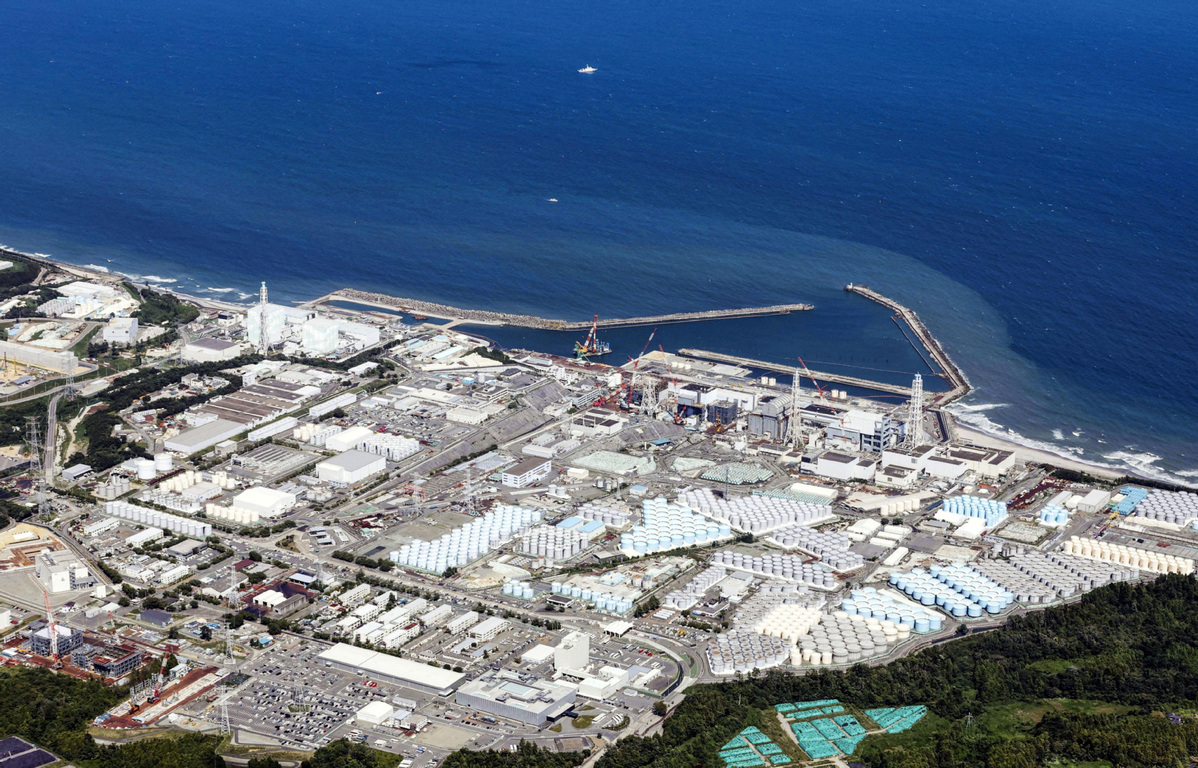Fukushima nuke water treatment questioned
By JIANG XUEQING | China Daily Global | Updated: 2023-08-30 09:47

Tokyo's stand evasive on presence of radioactive nuclides, envoy says
Japan was officially asked by China to answer why it deliberately emphasizes the treatment of tritium while remaining evasive about other radioactive nuclides in connection with the discharge of nuclear-contaminated water from the Fukushima Daiichi Nuclear Power Plant into the sea.
"Japan claims that these nuclides met national safety standards after treatment, but it is widely known that the Fukushima contaminated water contains over 60 types of radioactive nuclides. Many of these nuclides lack effective treatment methods," Chinese Ambassador to Japan Wu Jianghao said during a meeting with Japanese Vice-Minister for Foreign Affairs Masataka Okano on Monday, further clarifying China's firm stand on the issue of releasing nuclear-contaminated water into the ocean.
Although the nuclear-contaminated water stored in tanks underwent purification through the Advanced Liquid Processing System, a representative of Tokyo Electric Power Company, the operator of the Fukushima plant, said 66 percent of the water has not effectively removed radioactive substances other than tritium, and has exceeded the discharge standards, Japan's leading commercial TV networks TBS reported on Saturday.
Takeshi Takano, 72, a fisherman in Fukushima Prefecture, told TBS that while the Japanese government and TEPCO continue to release toxic water into the sea, his feeling of distrust in them was gradually growing.
"From the beginning, they were bent on ocean discharge, going ahead without listening to our opinions," Takano said.
Despite strong domestic and international opposition, Japan proceeded with the discharge plan. The decision poses significant risks and unpredictable hazards to the global marine environment and human health, causing outrage among the international community, Wu said.
Japan must face the reality, reflect on its actions and immediately halt the discharge, he said.
The grave concern and opposition expressed by China, based on scientific and factual evidence, is entirely reasonable and justifiable, he said.
On Japan's monitoring plan, Wu said it is "neither comprehensive nor systematic", as it fails to monitor all the discharged nuclides. Moreover, the monitoring process does not cover a wide range of marine species, and thus cannot fulfill the requirement for long-term assessment of marine ecological impact.
Data manipulation
"Most of the data released by Japan are sampled, tested and reported by Tokyo Electric Power Company. Considering TEPCO's history of data manipulation, concealment and falsification, the international community has a valid reason to doubt the authenticity and credibility of its data," Wu said.
"If Japan is truly confident about the safety, it should actively support the establishment of a long-term international monitoring arrangement that involves full and effective participation from all relevant parties, including independent third-party monitoring conducted by other countries," Wu told Okano.
During their meeting, Wu strongly protested against disruptions faced by the Chinese embassy and consulates in Japan, as they have received a large number of phone calls from within Japan, seriously interfering with their normal operations.
China urged Japan to handle the issue in accordance with the law and effectively ensure the safety of the Chinese embassy and consulates, Chinese institutions, companies, citizens and tourists in Japan.
A vast majority of countries, including many citizens within Japan, hold critical and opposing views on the ocean disposal plan, said China's Foreign Ministry spokesman Wang Wenbin at a news conference in Beijing on Tuesday. Japan should not turn a blind eye to it, he added.
"It is particularly important to emphasize that the issue of releasing nuclear-contaminated water into the sea concerns marine environments and human health. It is not solely Japan's affair, and it cannot be treated as a matter that can proceed unhindered simply because a few countries may have given political consent," Wang said.
"Japan's actions further reveal its prioritization of power over the international community and its disregard for international public interests in favor of its own interests," he said.
While the United States administration has not openly expressed disapproval of Japan's discharge plan, Washington has sharply reduced its imports of Japanese aquatic and agricultural products so far this year.
























